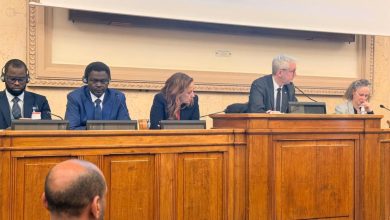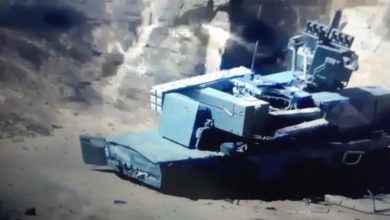Reports
The UAE and the Rapid Support Forces… Opening Pandora’s Box of Evil (4-5)

Sudan Events – Agencies
“Pandora’s Box” in Greek mythology is a box carried by Pandora that contains all the evils of humanity, such as greed, arrogance, slander, lies, envy, weakness, rudeness, and hope. In Greek legends, after Prometheus stole fire, Zeus ordered his son Hephaestus to create the woman Pandora as part of the punishment for humanity. Pandora was given many gifts by Aphrodite, Hermes, the Charites, and the Horae. Prometheus warned his brother Epimetheus not to accept any gifts from Zeus out of fear of retaliatory actions, but Epimetheus did not listen and married Pandora, who possessed a box that Zeus had given her, ordering her not to open it. However, Pandora opened the box, and all the evils of humanity escaped from it.
And so… drawing a parallel, all kinds of evil have emerged for the Sudanese from the UAE during the reign of Mohamed bin Zayed, which has transformed under his leadership into Pandora’s Box of all evil towards Sudan and its people, and many other countries. The UAE’s unlimited support for the militia has become a major global question, with the fundamental question being: Why is the UAE doing this, what does it want from Sudan, and why is it spending so generously? In this series of episodes, we will provide conclusive evidence of the forms of support that the UAE is providing to the militia, including all kinds of weapons, vehicles, and even the officers responsible for this matter. We will also mention the complaints Sudan has filed against the UAE, international evidence, reports from the Security Council, and reports from global news agencies that prove UAE’s support for the militia with evidence. We will delve deeper into the UAE’s chief agent, who holds all the grudges against his own people, the former director of President Omar al-Bashir’s office, who holds multiple nationalities and passports (Taha al-Hussein).
Weapons Transfer Documents
The armed forces discovered weapon transfer documents, ammunition, and military supplies signed by Captain Said Mohamed Al-Hassani found inside a “Nimr” armored vehicle in the Shajara area. Additionally, a movement log for a special operations unit, signed by Captain Mohamed Abdullah Al-Shahi, was also discovered in a “Nimr” armored vehicle in the same area. There was also a sample document for a parachute jump statement signed by Captain Mohamed Abdullah Al-Shahi, who is listed as the leader of the special operations group. Other documents found included rosters for the emergency response unit and a travel schedule for the special operations group, all signed by Captain Al-Shahi, and all of these were found inside the “Nimr” armored vehicle in Shajara.
From these documents, it is evident that UAE special forces were involved in carrying out operations or transporting military supplies and ammunition within the Khartoum state. It is hard to believe that military officers would hand over armored vehicles containing such critical documents that clearly implicate the UAE unless they themselves were inside these armored vehicles. It appears they were later evacuated, either as dead or wounded, or whatever else happened to them.
Military Equipment
One of the oddities discovered were military equipment and uniforms specific to the UAE Armed Forces, featuring the UAE flag. Many militia members were seen wearing these uniforms in videos posted on social media without any regard for the UAE. Military patches belonging to the UAE army were also found at militia locations in Khartoum.
Medical and Food Supplies
It seems the UAE spent lavishly on the militia, perhaps believing it would receive something in return in the future. In addition to weapons and ammunition, the UAE’s support also included medical supplies and ready-made food. Large quantities of medicines produced by “Global Pharma” in Dubai, UAE, were found at militia-held sites. Additionally, large quantities of ready-made meals, produced by the U.S. Agency for International Development (USAID) in Lagos, Nigeria, were discovered at militia sites near the Jeli Refinery. It is worth noting that this type of food aid had not been provided to any Sudanese state.
Mercenary Camps
One of the greatest catastrophes in this war, which has been backed by unlimited UAE support, is the issue of mercenaries. Mercenaries from over 13 countries participated in this war, some as snipers, others operating drone control rooms, and some as infantry. The militia benefited from UAE support in recruiting a large number of mercenaries from various West African countries, in addition to significant activity from the militia and its representatives in Libya. They also brought in technical experts to train and install drone systems and to train snipers. There are mercenary training and assembly camps in Chad and Libya.
We will try to publish evidence, documents, and reports proving the involvement of mercenaries from various countries in this war. For example, Ethiopian mercenary sniper passports were found, who fought in the battles of Omdurman, as well as Nigerian sniper passports, also involved in the same battle.
Among the passports found were one belonging to Chadian mercenary Omar Abdullah (passport number AR 0374641). Personal cards belonging to members of the social Touareg tribe in Benghazi, Libya (membership number 0451) were also found in one of the vehicles seized from the militia.
Colombian Mercenaries
The story of the Colombian mercenaries began in mid-November, when the world was introduced to a new chapter in the UAE’s involvement in Sudan’s war and support for the Rapid Support Forces. In a successful ambush, the Sudanese army and joint forces seized large quantities of weapons coming from the UAE to supply the militia in the border triangle between Libya, Chad, and Sudan. The large quantities of weapons were not the most noteworthy aspect this time, however. During the ambush, several foreign mercenaries were killed, which was not new, but what was new was the discovery of documents (passports, IDs) proving that these mercenaries were coming from overseas, specifically from Colombia via the UAE. It seems that the army’s strong operations, alongside supporting forces, had depleted most of the mercenaries coming from African countries (Niger, Chad, Ethiopia, Mali, etc.), forcing the UAE to look for mercenaries from across the seas, particularly from Colombia, which is a cheaper source for mercenaries.
Colombian Story
A report by the Colombian newspaper La Silla revealed that two groups of former Colombian soldiers participated in the Sudanese war alongside the militia. The report, written by Colombian journalist Santiago Rodríguez Álvarez, stated that over 300 Colombian soldiers were involved in the war in Sudan or on their way there. According to the report, the soldiers were contracted for $2,600, while sergeants were paid $3,400. The soldiers explained that they left Colombia for the UAE in several groups, first to Abu Dhabi and Dubai, then to Libya. According to two sources who testified to La Silla, they were flown from the UAE to Benghazi, where they were taken to shelters built by Gaddafi for Libyan authorities. One Colombian officer explained that the plan was for three battalions of Colombian mercenaries to arrive in Sudan, between 1,500 and 1,800 soldiers. Another retired Colombian officer in Sudan, whose testimony was shared with the newspaper through audio recordings, stated that his unit was nearly half an hour away from Al-Fasher when they came under attack by the Sudanese army in late October. In that attack, three Colombians were killed, and others were wounded. The officer admitted that they had been recruited through deception and against their will.



